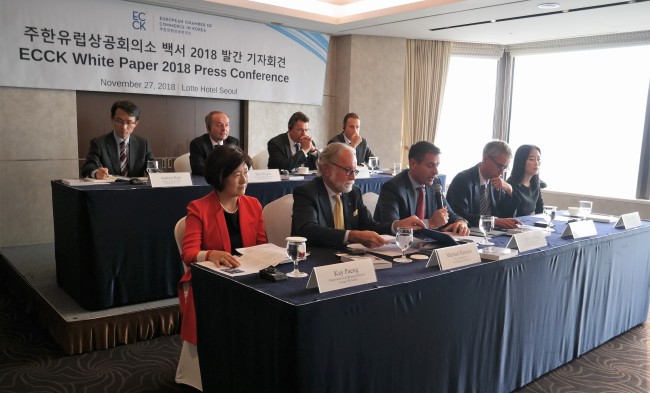European companies doing business in South Korea called on the Korean government to bring the nation’s business regulations in line with international standards, a step they said would benefit both foreign firms doing business here and domestic exporters in the global market, during a press conference in Seoul on Tuesday.
Since the Korea-European Union free trade deal was implemented in 2011, the trade volume between the two regions has gradually risen. The EU is currently the largest source of foreign direct investment in Korea, with FDI from EU businesses amounting to $6.5 billion last year.
 |
(ECCK) |
Despite those impressive figures, European companies say Korea still needs to provide a more open business environment and that many regulations continue to hamper trade and business.
Korea ranks 51st among 67 countries on the FDI Regulatory Restrictiveness Index devised by the Organization for Economic Cooperation and Development. Korea also ranked 79th out of 138 countries in terms of burdensome government regulations, according to the World Economic Forum’s global competitiveness report released last month.
“In Korea, there are still many cases where rules and regulations that affect foreign businesses, as well as domestic businesses, change too quickly without adequate input from stakeholders,” said Dimitris Psillakis, chairman of the European Chamber of Commerce in Korea and CEO of Mercedes-Benz Korea, during the press conference organized by the ECCK.
“To realize the golden opportunity to attract FDIs, it is important that the government creates the right environment for businesses to expand,” Psillakis said.
Christoph Heider, the ECCK’s president, said Korea’s business openness should be raised to the OECD level -- mainly the US and the EU -- because Korea is no longer a small country but is a nation with the 11st largest economy and the fifth-largest exporter in the world.
“You can see Korean products from digital devices, automobiles to ships everywhere. Improving the nation’s regulations will also make the moving of Korean goods smoother in the global market,” he said.
He added, in a similar way, the EU is also encouraging Korea’s rival economies China and Japan to adopt a more globalized standards.
During the event, the ECCK released its fourth edition of ECCK White Paper that includes 123 recommendations to the Korean government and its ministries. It deals with key industry issues and suggestions raised by the European business community across 14 different sectors, including automotive, healthcare, intellectual property rights, food and kitchen home appliances.
“The publication echoes the European business community’s desire to support the Korean government to develop the current regulatory framework, which will benefit both foreign companies and the Korean economy as a whole,” said Psillakis.
The event was also attended by Michael Reiterer, ambassador of delegation of the EU to Korea, as well as chairpersons of ECCK industry committees including representatives from GSK Korea, Groupe SEB Korea, Louis Vuitton, MAN Truck & Bus Korea, Mercedes-Benz Korea and Nestle Korea.
By Shin Ji-hye (
shinjh@heraldcorp.com)








